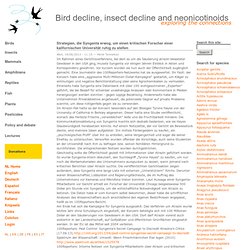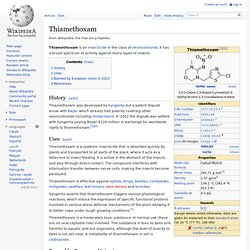

Syngenta > Crop Protection > Main. Syngenta Chief Slams EU Pesticide Ban. Tyrone B. Hayes - atrazine - Syngenta. Pest Control: Syngenta’s Secret Campaign to Discredit Atrazine’s Critics. To protect profits threatened by a lawsuit over its controversial herbicide atrazine, Syngenta Crop Protection launched an aggressive multi-million dollar campaign that included hiring a detective agency to investigate scientists on a federal advisory panel, looking into the personal life of a judge and commissioning a psychological profile of a leading scientist critical of atrazine.

The Switzerland-based pesticide manufacturer also routinely paid “third-party allies” to appear to be independent supporters, and kept a list of 130 people and groups it could recruit as experts without disclosing ties to the company. Recently unsealed court documents reveal a corporate strategy to discredit critics and to strip plaintiffs from the class-action case.
The company specifically targeted one of atrazine’s fiercest and most outspoken critics, Tyrone Hayes of the University of California, Berkeley, whose research suggests that atrazine feminizes male frogs. UC Berkeley Professor Dr. Strategien, die Syngenta erwog, um einen kritischen Forscher einer kalifornischen Universität ruhig zu stellen. Im Rahmen eines Gerichtsverfahrens, bei dem es um die Säuberung atrazin-belasteter Gewässer in den USA ging, musste Syngenta vor einigen Jahren Einblick in Akten und Korrespondenz gewähren.

Vor kurzem wurden sie nun auch der Öffentlichkeit zugänglich gemacht. Eine Journalistin des 100Reporters-Netzwerks hat sie ausgewertet. Ihr Fazit: der Konzern habe eine „aggressive Multi-Millionen-Dollar-Kampagne“ gestartet, um Kläger zu entmutigen und negative Berichterstattung über seine Agrochemikalien zu vermeiden. Einerseits habe Syngenta eine Datenbank mit über 100 wohlgesonnenen „Experten“ geführt, die bei Bedarf für scheinbar unabhängige Analysen oder Kommentare in Medien herangezogen werden konnten - gegen üppige Bezahlung.
Andererseits habe das Unternehmen Privatdetektive angeheuert, die potenzielle Gegner auf private Probleme scannte, um diese nötigenfalls gegen sie zu verwenden. Gleichzeitig sollte die Öffentlichkeit gezielt mit Informationen über Atrazin gefüttert werden. Wikipedia: Syngenta. Syngenta AG is a global Swiss agribusiness that markets seeds and agrochemicals. Syngenta is involved in biotechnology and genomic research. It was formed in 2000 by the merger of Novartis Agribusiness and Zeneca Agrochemicals. The company was ranked third in total seeds and biotechnology sales in 2009 in the commercial market.[2] Sales in 2013 were approximately US$ 14.7 billion. Syngenta employs over 28,000 people in over 90 countries. Over half of the sales are in Emerging Markets.[1] Syngenta is listed on both the Swiss stock exchange and in New York.[1] History[edit] Based in Basel, Switzerland, Syngenta was formed in 2000 by the merger of Novartis Agribusiness and Zeneca Agrochemicals.[3][4] Its roots are considerably older.
Zeneca Agrochemicals was part of AstraZeneca, and formerly of Imperial Chemical Industries. Syngenta finances the Syngenta Foundation for Sustainable Agriculture. SYNGENTA. Wikipedia: Thiamethoxam. Thiamethoxam is an insecticide in the class of neonicotinoids.

It has a broad spectrum of activity against many types of insects. History[edit] Thiamethoxam was developed by Syngenta but a patent dispute arose with Bayer which already had patents covering other neonicotinoids including imidacloprid. In 2002 the dispute was settled, with Syngenta paying Bayer $120 million in exchange for worldwide rights to thiamethoxam.[3][4] Uses[edit] Thiamethoxam is a systemic insecticide that is absorbed quickly by plants and transported to all parts of the plant, where it acts as a deterrent to insect feeding. Thiamethoxam is effective against aphids, thrips, beetles, centipedes, millipedes, sawflies, leaf miners, stem borers and termites. Syngenta asserts that thiamethoxam triggers various physiological reactions, which induce the expression of specific functional proteins involved in various stress defense mechanisms of the plant allowing it to better cope under tough growing conditions.[5]
Greenpeace entert Syngenta-Gebäude - News Basel: Stadt. Greenpeace macht Syngenta für das weltweite Bienensterben mitverantwortlich.

Mit einer Guerilla-Aktion in Basel machen die Umwetschützer nun auf das Problem aufmerksam. 1/5 Mit einem riesigen Banner am Syngenta-Gebäude in Basel fordert Greenpeace ein umfassendes Verbot bienenschädlicher Pestizide, als wirksamen Schritt gegen das Bienensterben.Bild: Greenpeace Artikel zum Thema. Syngenta pesticides kill bees. Thiaméthoxame (Cruiser) INSECTICIDES NEONICOTINOIDES.
AnnLieTwit : Mooi achtergrondartikel in...